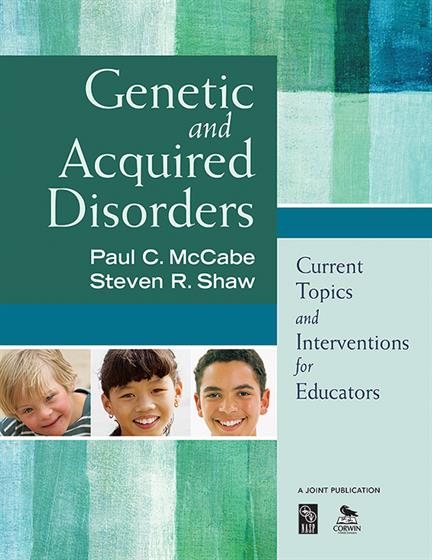Preface
Acknowledgments
Part I. Advances in Health Care and Coping with Loss in Schools
1. Advances in Health Care and Medical Science: Presenting New Challenges for Schools
Advances in Medical Science
Increased Survival Rates
Greater Specificity of Medical Diagnosis and Treatment
Increased Emphasis on Outpatient Care
Changing Role of Schools
Increase in Pharmacological Interventions
Multidisciplinary Approach
References
2. Grief and Bereavement: Roles for Educators
Introduction
Background
Implications for Educators
How to Tell Students about a Death
Notification and Announcement Procedures
Parent Notification
Determine the Degree of Trauma
Concerns about Death due to Suicide
Educational Strategies
Discussion Questions
Research Summary
Handout-Grief and Bereveament in the Schools
Part II. Chromosomal, Genetic, and Metabolic Disorders
3. Rare Chromosomal Disorders
Introduction
Background
Genetics Evaluation
Chromosomal Abnormalities
Potential for Intervention
Future Work
Implications for Educators
Educational Strategies
Discussion Questions
Research Summary
Handout-Children with Rare Chromosomal Disorders
4. Phenylketonuria (PKU): Implications for Educators and Schools
Introduction
Background
Prevalence, Symptoms and Treatment
Cognitive and Neurological Effects
Executive dysfunction
Maternal Phenylketonuria
Timing and Degree of Exposure
Implications for Educators
Dietary Compliance
Educational Strategies
Discussion Questions
Research Summary
Handout-Phenylketonuria (PKU)
5. Genetics of Autism: Theories, Findings, and Implications
Introduction
Background
Knowing Which Families Are At Risk
Techniques to Identify Genetic Contributions
Known Genetic Causes
X-linked genes
Chromosomal Duplications
Chromosomal Deletions
Candidate Genes
Multiple Gene Complications and Unknowns
Possible Environmental Causes
The Role of Genetic Counseling and Testing
Implications for Educators
Home- and School-based Treatment and Interventions
Educational Strategies
Discussion Questions
Research Summary
Handout-The Genetics of Autism
6. The Biology of Shyness
Introduction
Background
The Role of the Amygdala
Amygdala and Cortisol Levels: The HPA System
Psychological and Immune Correlates of HPA Activation
Implications for Educators
Educational Strategies
Discussion Questions
Research Summary
Handout-The Shyness in Children
7. Families of Children with Genetic Disorders
Introduction
Background
Asking Questions of Professionals
Managing Emotional Trauma
Stresses Faced by Families of Children with Genetic Disorders
Mothers of Children with Genetic Disorders
Fathers of Children with Genetic Disorders
Marital Stress in Families of Children with Genetic Disabilities
Siblings of Children with Genetic Disabilities
Increased Responsibilities of Siblings
Strengths in Families of Children with Genetic Disorders
Family Resilience
Positive Changes in Sibling Development
Educational Strategies
Discussion Questions
Research Summary
Handout-Helping Families with a Child with a Disability
Part III. Acquired Disorders of Childhood
8. Prenatal Alcohol Exposure: Biological and Behavioral Outcomes
Introduction
Background
Neuroanatomical Effects of Prenatal Alcohol Exposure
Alcohol’s Effect on the Neocortex, Hippocampus, Cerebellum, and Neurotransmission
Neocortex
Hippocampus
Cerebellum
Neuronal level
Typical Anatomical Features of Children with Fetal Alcohol Exposure
Neurobehavioral Effects of Prenatal Alcohol Exposure
Implications for Educators
Educational Strategies
Discussion Questions
Research Summary
Handout-Effects of Prenatal Alcohol Exposure on Children
9. Prenatal Exposure to Antidepressants
Introduction
Background
Types of Antidepressants
Selective Serotonin Reuptake Inhibitors (SSRIs)
Tricyclic Antidepressants (TCAs)
Monoamine Oxidase Inhibitors (MAOIs)
Untreated Depression
Conclusion
Implications for Educators
Educational Strategies
Discussion Questions
Research Summary
Handout-Information about Prenatal Exposure to Antidepressants
10. Celiac Disease and Youth: Implications for Educators and Allied Professionals
Introduction
Background
Prevalence
Symptoms
Diagnosis
Treatment: The Gluten-Free Diet
Issues in the Treatment of Celiac Disease
Complications and Consequences of Untreated Celiac Disease
Dietary Adherence
Barriers to Dietary Adherence
Co-morbidity in CD
Implications for Educators
Strategies to Support Students with CD
Support the child with CD
Support the adults
Dietary adherence
Managing pain
Toileting needs
School absenteeism
Psychological treatment and evaluation
Educational Strategies
Discussion Questions
Research Summary
Handout-Celiac Disease: Helpful Hints for Educators
11. Post-partum Depression and its Relation to Behavior Problems in Children
Introduction
Background
Maternal Depression and Childhood ADHD
Child-Family Dynamics
Implications for Educators
Educational Strategies
Discussion Questions
Research Summary
Handout-Identifying and Treating Post-partum Depression
12. Pediatric Responses to Asthma: An Overview for Educators
Introduction
Background
Experience of Symptoms
Impact on Student Functioning
Psychosocial Implications
Implications for Educators
Educational Strategies
Discussion Questions
Research Summary
Handout-Pediatric Responses to Asthma
13. Food Allergies and Intolerances: What Educators Need to Know
Introduction
Background
What is a Food Allergy?
How Can an Allergy Cause Death?
How Do Food Allergies Develop?
Does Food Allergy Management Differ by Developmental Stage?
What Social-emotional or Behavioral Issues are Associated with Food Allergies?
What is the Status of Research on Causes and Treatments?
Implications for Educators
Create a Core Team
Food Allergy Emergency Plan
Storing of Medications
Label Literacy
Empowering Children with Food Allergies and their Peers
Educational Strategies
Discussion Questions
Research Summary
Handout- Successfuly Managing Food Allergies in Childhood
14. Developmental Effects of Type 1 Diabetes
Introduction
Background
Acute Effects
Long-Term Effects
Physical Effects
Cognitive Effects
Academic Achievement
Social-Emotional Functioning
Implications for Educators
Educational Strategies
Discussion Questions
Research Summary
Handout-General Information about Type 1 Diabetes
Appendix
Glossary
References
Index



